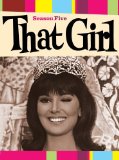| Reviews & Columns |
|
Reviews DVD TV on DVD Blu-ray 4K UHD International DVDs In Theaters Reviews by Studio Video Games Features Collector Series DVDs Easter Egg Database Interviews DVD Talk Radio Feature Articles Columns Anime Talk DVD Savant Horror DVDs The M.O.D. Squad Art House HD Talk Silent DVD
|
DVD Talk Forum |
|
|
| Resources |
|
DVD Price Search Customer Service #'s RCE Info Links |
|
Columns
|
|
|
That Girl - Season Five
Nope. She didn't marry nice-guy Donald, after all. Shout! Factory has released That Girl - Season Five, the final go-around for the wacky, charming (and sometimes politically motivated) adventures of delightful aspiring New York actress, Ann Marie, played to winning perfection by Marlo Thomas. All 24 episodes of the 1970-1971 season are presented here in this nicely-packaged, colorful 4-disc boxed, finishing out the series for fans anxious to see the entire show on DVD. Groundbreaking at least from the standpoint of showing a single girl making it on her own in the big world, That Girl's final run tones down the political rhetoric from the last season I watched (season three), presenting a more classically-themed sitcom that still gets big laughs four decades later.
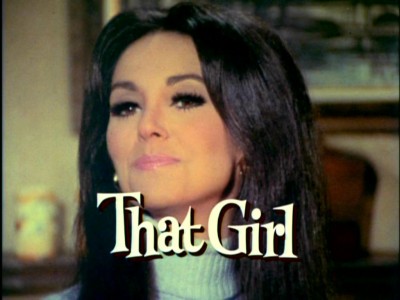
I've written before about the aesthetics and politics of That Girl in two previous reviews (you can click here to read my Season Two review, and here for Season Three), so I won't go into too much background on the show itself. Unfortunately, I missed Season Four, so I can't vouch for any transitions the show made from Season Three to Season Five, but what does come through is a lessening of the stridency of the political messages in favor of more "traditional" sitcom plots and themes, giving the fifth season of That Girl a more classical, and ironically, less dated feel, than the Third Season. The premise of the series, for the few who might be reading this but who are unfamiliar with the show, revolves around the comical adventures of young, struggling actress Ann Marie (Marlo Thomas), now several years into her first venture outside of her previous small town life, which she abandoned to become an actress in New York City. Watched over obsessively by her father, Lou Marie (Lew Parker), a restaurant owner who fears the corrupting influence of the city and the theatre milieu on his daughter, Ann finds it more than a little difficult to navigate her romantic life with Lou's constant interruptions. Ann's boyfriend, Donald Hollinger (Ted Bessell), is one of NYC's most sought-after writers (he writes for Newsview magazine); his cool, collected demeanor is often tested when Ann's personal and professional hiccups threaten to spin out of control. But through it all, they both love each other (and, importantly, crack each other up), with Donald's persistent marriage overtures finally paying off when Ann accepts his engagement ring.
The memories of That Girl were always pleasant ones for me (it truly is a "pleasant" show, in the best sense of that word). I remember catching it on ABC's weekday schedule at times (sometime before Dark Shadows, maybe?), when I was home sick from school. It presented that fictional view of New York City so familiar to TV viewers of that era (as did The Odd Couple and others) as a cultural and comedic fantasyland devoid of any of the realities like crime or pollution or incivility (almost all network sitcoms from this period presented urban settings this way). Who didn't want to visit New York after watching That Girl, wondering if you were going to catch a glimpse of cute Ann Marie flying her kite in Central Park, or watching her twirl around down by the docks, or hear her and Donald - or people like them - bantering playfully at a small restaurant like their favorite, Nino's? Watching the show now, the innocence of the concept and execution are almost startling when you see what passes for sitcoms today, so experiencing the show is like a time capsule not of the times, but of our TV memories of the times - always an unsettling experience.
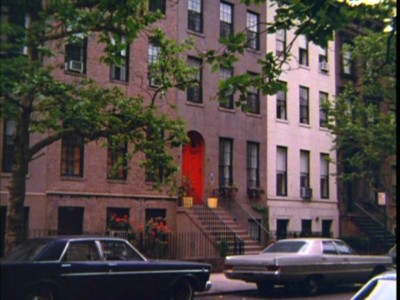
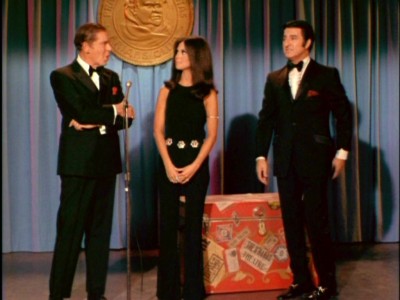
That being said, That Girl this fifth season seems to be concentrating more on "classical" sitcom situations, while leaving the overtly politically-themed plots behind. While Ann finds herself involved in more traditional "whacky" comedic situations and plots such as dealing with swapped photos of her head on a Playpen centerfold (I Ain't Got No Body), learning all about her unwilling neighbors to win a TV quiz show (No Man is Manhattan Island), losing her engagement ring in a cheese cake (That Cake), consoling her father who's feeling his age (That Girl's Daddy), wrangling her con-man Uncle Herbert (An Uncle Herbert For All Seasons), doing a stand-up act with Milton Berle and her father, Danny Thomas (Those Friars), sheltering a defecting Russian comedian (The Russians Are Staying), becoming an unwitting professional shoplifter (That Shoplifter), trying to manage her father's restaurant (Chef's Night Out), and losing the ticket to a winning horse race Two for the Money), the plots aimed squarely at "the times" are fewer and farther between (and not nearly as funny, naturally). There's an episode about demeaning racial stereotypes in entertainment (That Senorita), and Ann's involvement with an environmental group (Soot Yourself) and women's lib (The Elevated Woman - the title of which suggests executive producer Thomas was getting a little annoyed with all the "Girl" tags), but for the majority of outings here, the comedy is focused on either outsized farce conventions, or on the evolving domestic tensions of Ann's and Donald's progressing relationship.
And frustratingly, those are the episodes I found the most interesting - "frustratingly," because Thomas refused to continue the show as a "married sitcom." After a build-up of five years of having Donald pursue Ann towards the altar, with the series even going so far this season as to have Donald give her a ring (she accepts), and for Ann to have a bridal shower and Donald a stag party, executive producer Thomas was adamant that the show not end with Ann's marriage to Donald (she states this quite clearly in one of the episode commentaries here). Her reasoning was that girls shouldn't be shown that marriage was the key to happiness for Ann (for the record, Ms. Thomas in real life has been married now for 29 years). That seems a rather narrow reading of the impact of Ann's act, had she married, considering how the show portrayed the idea of marriage throughout its run, as well as in context to the surprisingly giving, open, balanced relationship she had with Donald. I'm always skeptical of the weight given to entertainment programs as to their influence on viewers' thinking and behavior (I don't believe viewers are as malleable as Hollywood or social critics think; I believe most viewers understand they're watching television - not real life). So I reject Thomas' belief that showing Ann's marriage would have presented only one intellectual option for viewers to take away from the show: a girl can only be happy if she's married.
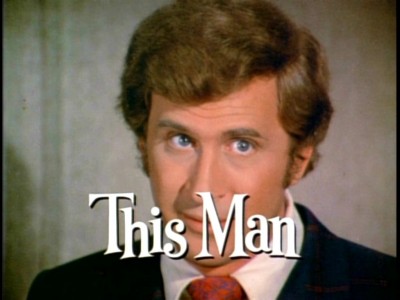
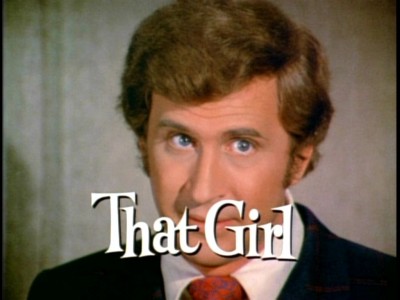
If anything, having Ann not married at the end of the show - and importantly, ending the show before the series could explore her new status with Donald - feels more like a cop-out than a positive political statement. That Girl ends without ever resolving Donald's and Ann's relationship - which is okay; in one way, it actually gives their relationship a "timeless" quality that doesn't put a period on the viewers' experiences with the series. However, the rejected chance of having Thomas and the writers explore Ann's marriage within the context of the turbulent times evolving onto the early 70s television screens, seems like a missed opportunity when you see the quality of the writing in the episodes that deal specifically with Ann's and Donald's engagement. Both Ann and Donald each get an episode where they seriously doubt their commitment to each other, while the two-parter, There Sure Are a Bunch of Cards in St. Louis, show both Ann and Donald coming to grips with the reality of their marriage, as seen through the eyes of Donald's parents. This episode has some beautifully written scenes; I particularly liked the gentle, loving quality of the scene in Donald's bedroom, as Ann looks over his boyhood treasures and expresses happiness at the thought of him being a boy. The morning breakfast ritual with Donald's parents is razor-sharp in not only its comedy (Thomas and Bessel truly are an inspired pairing), but also its honesty in detailing the often awkward situations between newly-marrieds and in-laws.
The series already had a "model" of a happy marriage - Ann's parents - so the notion of marriage was never given a sustained negative spin (Jerry Bauman, Ann's neighbor and Donald's best friend, played hilariously by Bernie Kopell, also has a seemingly happy marriage). As well, the nature of Donald's relationship with Ann - a more patient, understanding, loving boyfriend there never was on television - didn't seem to indicate any impediments to Ann's marriage. If the decision to keep Ann single was based on a political motive, than why all the ecstasy when Ann is asked (there's a surreal jumpcut of Ann in a state of slow-motion, dream-like euphoria when Donald asks her)? If Ann was nervous from the start about the engagement, or constantly second-guessing the wisdom of getting "tied down" to Donald, why didn't the series explore that? If marriage was such a problem for Thomas, why not spell out those thoughts through Ann? If Thomas had as much influence over the show as she said she had, surely this could have been explored. And had Thomas stuck with the series, and let Ann marry, imagine the storylines she could have tackled about the couple's wedding, now that network television standards were soon to explode with All in the Family's ground-breaking realism? She could have done this even if she kept Ann and Donald apart - or even if she had broken them up (that would have been interesting, too). Instead, the series just...stops, not ends, with the majority of viewers I suspect, wondering what happened to Ann and Donald as a couple, rather than noodling over the so-called political impact of her character's non-action.
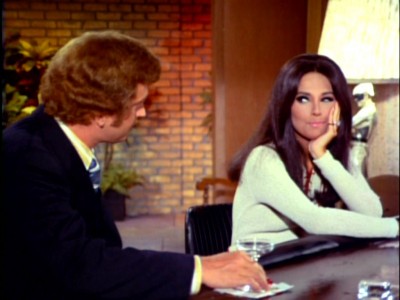
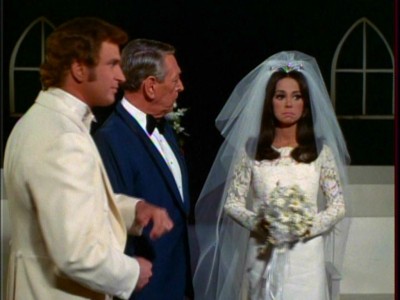
DISC ONE
Counter Proposal
Donald pops the big question to Ann...with a second-hand ring.
Donald, Sandi, And Harry and Snoppy
Donald's widowed sister Sandi becomes romantically involved with a smoothie who seems to be hitting on Ann.
I Ain't Got No Body
Ann's headshot photo for a shampoo ad soon winds up on a different body: that of the latest Playpen centerfold.
No Man Is Manhattan Island
Ann lands an appearance on the game show, Get Rich Quick, but she won't be making any money until she learns all the intimate details about her shadowy neighbors.
Rattle of a Single Girl
Ann thinks she's made a mistake in choosing Donald as her life partner, so she seeks counseling for them both.
There Sure Are a Bunch of Cards in St. Louis (Part 1)
Ann lands a part in a play in St. Louis - Donald's hometown. So it's time to spend the weekend with the in-laws.
DISC TWO
There Sure Are a Bunch of Cards in St. Louis (Part 2)
Ann's trip to Donald's in-laws becomes a disaster of awkward pauses and miscues.
That Cake
As spokemodel for the "New York Has Everything" display, Ann bakes a cheesecake for the Governor...and loses her engagement ring in it.
That Girl's Daddy
Ann worries when a friend of hers takes a shine to Lew...who's feeling old and neglected (and with the prospect of someone young and beautiful admiring him, picking up his spirits considerably).
Stop the Presses, I Want to Get Off
Ann snags a job as a cub reporter for the Girl Friday sheet, but only because the editor knows that Donald will wind up re-writing her terrible stories.
Super Reporter
Jerry and the gang pull a joke on Donald when he wins a Humanitarian Award: they take his clothes and leave him in a superman costume.
That Senorita
Ann becomes involved with a group that wants to end demeaning ethnic stereotypes.
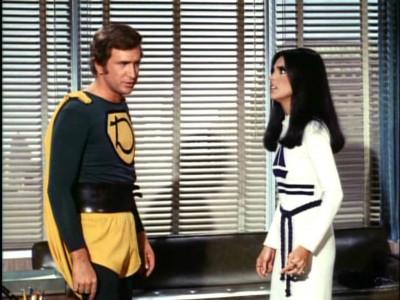
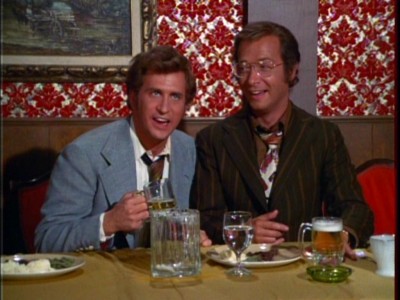
DISC THREE
An Uncle Herbert For All Seasons
Ann's shady Uncle Herbert comes for a visit, ensnaring Donald's boss in a fishy scheme.
That Script
Ann finds a notorious story that has never been adapted for the movies, and finds out why when she meets the mysterious author.
Those Friars
A long-dead uncle of Ann's leaves her a trunk...which leads to Milton Berle and Danny Thomas fighting over who gets to buy it.
A Limited Engagement
Donald gets cold feet when he contemplates marriage to Ann.
The Russians Are Staying
Ann befriends a Russian comedian who is thinking of defecting to the United States.
That Shoplifter
Ann is hired as a store shoplifter to test the store's security features.
DISC FOUR
Chef's Night Out
Lew is on vacation, and there are troubles at his restaurant, so Ann and Donald come to the rescue.
That King
The State Department wants a favorable treaty with a small country, so they enlist Ann to date its king. A boy king.
Stag Party
Donald gets his stag party...for the marriage he never gets.
Two For the Money
Ann loses a valuable Daily Double ticket Donald and his buddies at the office entrusted to her.
Soot Yourself
Ann gives Donald a hard time about not writing enough articles about pollution.
The Elevated Woman
Donald is forced to go to Ann's women's lib meeting...but a stuck elevator saves him.
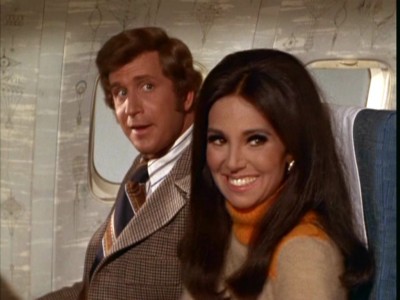
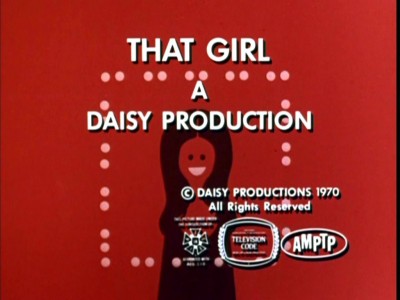
The DVD:
The Video:
Shot on 35mm film, That Girl - Season Five looks great in this full screen transfer (just like the previous seasons I've watched). Colors are saturated, and only one or two scenes seem a bit faded. Normal, minor screen anomalies associated with 40-year-old series do occasionally pop up. Compression issues are negligible.
The Audio:
The Dolby Digital English mono sound mix accurately reflects the original broadcast presentation. It's sharp and clear. Close-captions are available.
The Extras:
Again, there are several episode commentaries by Marlo Thomas and co-creator Bill Persky that are generally worthless. Consisting of long, long passages of silence punctuated by an occasional, "Oh, that's cute," or "I wonder what's going to happen next," these commentaries cry out for a moderator with a notebook full of questions to keep the participants involved and informative. Almost nothing of worth concerning the show, its production, or reception, are imparted to the audience. And worth noting again (even though we won't be getting any more commentaries from Thomas and Persky): five minutes of prep time prior to watching the shows - or even a P.A. with a laptop connected to the IMDB - could have saved both of you from the embarrassment of noticing highly-respected character actors like Kenneth Mars, Michael Conrad, Reva Rose, and Eric Brotherson, and saying, "Oh, they're good...who are they?" That attitude comes off as lazy and flip and arrogant, and matched with the paucity of not only information but just plain speech in these commentaries, makes these recorded entries exercises in total futility.
Final Thoughts:
I'm not sure Marlo Thomas' insistence that Ann Marie stay unmarried at the end of That Girl's five year run was either artistically or intellectually honest, but there's no denying that That Girl was still a sharply-written, warmly funny sitcom featuring two pros uniquely suited to each other's chemistry. Marlo Thomas and Ted Bessel (really underrated) make for one of television's brightest, funniest couples; it's a shame they couldn't have continued on - married or not. I highly recommend That Girl - Season Five.
Paul Mavis is an internationally published film and television historian, a member of the Online Film Critics Society, and the author of The Espionage Filmography.


|
| Popular Reviews |
| Sponsored Links |
|
|
| Sponsored Links |
|
|
| Release List | Reviews | Shop | Newsletter | Forum | DVD Giveaways | Blu-Ray | Advertise |
|
Copyright 2024 DVDTalk.com All Rights Reserved. Legal Info, Privacy Policy, Terms of Use,
Manage Preferences,
Your Privacy Choices | |||||||









